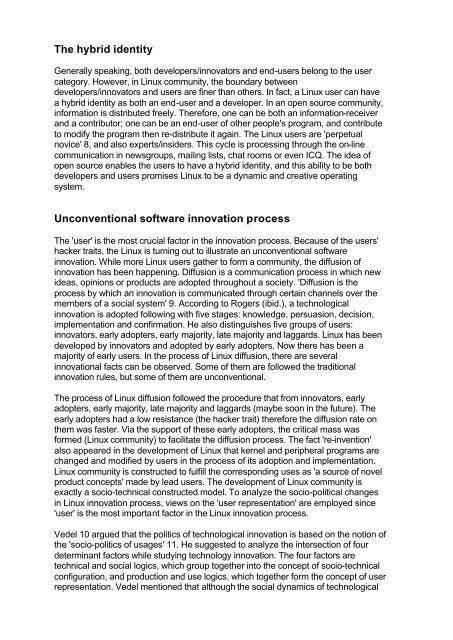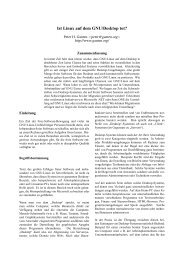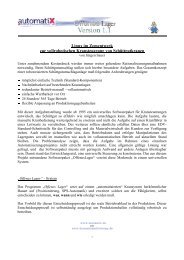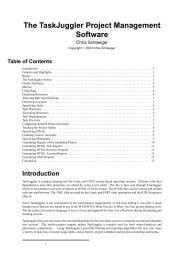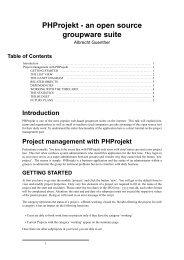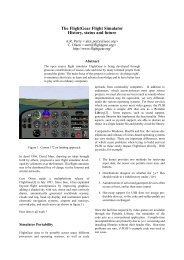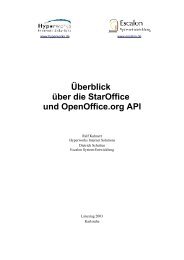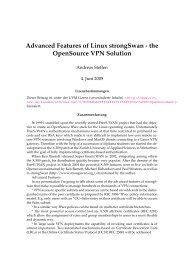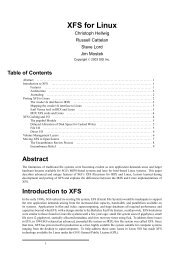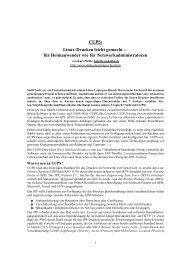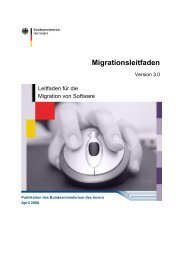Pan-hacker culture and unconventional software innovation ...
Pan-hacker culture and unconventional software innovation ...
Pan-hacker culture and unconventional software innovation ...
Create successful ePaper yourself
Turn your PDF publications into a flip-book with our unique Google optimized e-Paper software.
The hybrid identity<br />
Generally speaking, both developers/innovators <strong>and</strong> end-users belong to the user<br />
category. However, in Linux community, the boundary between<br />
developers/innovators <strong>and</strong> users are finer than others. In fact, a Linux user can have<br />
a hybrid identity as both an end-user <strong>and</strong> a developer. In an open source community,<br />
information is distributed freely. Therefore, one can be both an information-receiver<br />
<strong>and</strong> a contributor; one can be an end-user of other people's program, <strong>and</strong> contribute<br />
to modify the program then re-distribute it again. The Linux users are 'perpetual<br />
novice' 8, <strong>and</strong> also experts/insiders. This cycle is processing through the on-line<br />
communication in newsgroups, mailing lists, chat rooms or even ICQ. The idea of<br />
open source enables the users to have a hybrid identity, <strong>and</strong> this ability to be both<br />
developers <strong>and</strong> users promises Linux to be a dynamic <strong>and</strong> creative operating<br />
system.<br />
Unconventional <strong>software</strong> <strong>innovation</strong> process<br />
The 'user' is the most crucial factor in the <strong>innovation</strong> process. Because of the users'<br />
<strong>hacker</strong> traits, the Linux is turning out to illustrate an <strong>unconventional</strong> <strong>software</strong><br />
<strong>innovation</strong>. While more Linux users gather to form a community, the diffusion of<br />
<strong>innovation</strong> has been happening. Diffusion is a communication process in which new<br />
ideas, opinions or products are adopted throughout a society. 'Diffusion is the<br />
process by which an <strong>innovation</strong> is communicated through certain channels over the<br />
members of a social system' 9. According to Rogers (ibid.), a technological<br />
<strong>innovation</strong> is adopted following with five stages: knowledge, persuasion, decision,<br />
implementation <strong>and</strong> confirmation. He also distinguishes five groups of users:<br />
innovators, early adopters, early majority, late majority <strong>and</strong> laggards. Linux has been<br />
developed by innovators <strong>and</strong> adopted by early adopters. Now there has been a<br />
majority of early users. In the process of Linux diffusion, there are several<br />
<strong>innovation</strong>al facts can be observed. Some of them are followed the traditional<br />
<strong>innovation</strong> rules, but some of them are <strong>unconventional</strong>.<br />
The process of Linux diffusion followed the procedure that from innovators, early<br />
adopters, early majority, late majority <strong>and</strong> laggards (maybe soon in the future). The<br />
early adopters had a low resistance (the <strong>hacker</strong> trait) therefore the diffusion rate on<br />
them was faster. Via the support of these early adopters, the critical mass was<br />
formed (Linux community) to facilitate the diffusion process. The fact 're-invention'<br />
also appeared in the development of Linux that kernel <strong>and</strong> peripheral programs are<br />
changed <strong>and</strong> modified by users in the process of its adoption <strong>and</strong> implementation.<br />
Linux community is constructed to fulfill the corresponding uses as 'a source of novel<br />
product concepts' made by lead users. The development of Linux community is<br />
exactly a socio-technical constructed model. To analyze the socio-political changes<br />
in Linux <strong>innovation</strong> process, views on the 'user representation' are employed since<br />
'user' is the most important factor in the Linux <strong>innovation</strong> process.<br />
Vedel 10 argued that the politics of technological <strong>innovation</strong> is based on the notion of<br />
the 'socio-politics of usages' 11. He suggested to analyze the intersection of four<br />
determinant factors while studying technology <strong>innovation</strong>. The four factors are<br />
technical <strong>and</strong> social logics, which group together into the concept of socio-technical<br />
configuration, <strong>and</strong> production <strong>and</strong> use logics, which together form the concept of user<br />
representation. Vedel mentioned that although the social dynamics of technological


